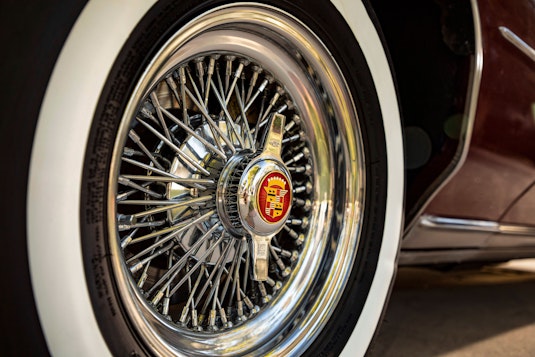Everything You Need to Know About Having Your Classic Car Detailed
Classic Car Detailing: How Often, How Much, and When It’s Worth Going Pro
For many classic car owners, detailing is one of the most enjoyable parts of ownership. You’re not wrenching under the hood or worrying about breaking something, you’re simply making the car look the way it deserves to look. And let’s be real: cruising in a clean, well-kept classic is half the reason we do this in the first place.
That said, a lot of owners still wonder how often they should be detailing their classic car, how much time is necessary, and whether it’s better to handle it themselves or hire a professional. Since every choice you make affects your car’s long-term condition and value, here’s a practical look at what classic car detailing should look like.
How Often Should You Detail a Classic Car?
There’s no single answer here. How often you detail your classic car really depends on how much you drive it and the conditions it’s exposed to.
If your car is driven regularly and spends time outside the garage, washing it every couple of weeks should be considered the bare minimum. For owners in colder climates, especially where salt and sand are common on the roads, a weekly wash is a smart move. Those materials can do real damage if they’re allowed to sit on paint, chrome, or trim.
If you want to be extra cautious, washing your car after every drive isn’t overkill. Every trip exposes your car to things like exhaust residue, dirt, bugs, and tree sap. Left alone, all of that can slowly eat away at the finish.
Hand-washing is always the right call for a classic. Use microfiber cloths or a sheepskin mitt and skip the automated car wash entirely. Even “soft touch” systems can scratch vintage paint or damage emblems and trim. Those quick gas-station washes are fine for daily drivers but not for classic cars.
It’s also important to use products that are made for older vehicles, including cleaners designed for vintage paint, proper tire and wheel treatments, and specialty products for vinyl tops, landau roofs, or convertible tops.
What About Interior Detailing?
For a classic car that sees regular road time, a thorough interior cleaning every three to six months is usually enough. If the car gets heavy use, or if you’re regularly carrying passengers, monthly interior detailing isn’t unusual.
How often you clean the inside really depends on usage, how much sun exposure the interior gets, and whether the car stays dry and well-ventilated when it’s stored.
How Much Detailing Is Enough?
Detailing a classic car doesn’t have to take all day, unless you enjoy it and want it to. Interior and exterior detailing also require different levels of effort.
When washing the exterior, always start at the top and work your way down. This keeps dirt from being dragged across already-clean panels.
The two-bucket method is worth the extra step:
- one bucket for soap
- one for rinsing your mitt.
It’s a simple habit that goes a long way toward preventing swirl marks and light scratches.
If you want to go further, a clay bar treatment can help remove stubborn contaminants that washing alone won’t touch. From there, use separate products for wheels and tires, rinse thoroughly, and finish with a quality wax. That final step not only adds shine but also provides a layer of protection for older paint.
Regular exterior detailing also gives you a chance to spot small chips or scratches early (before they turn into bigger cosmetic or corrosion problems).
Inside the car, work from top to bottom. Clean the glass first, then move to the dashboard, trim, and steering wheel. Vacuum seats and carpets, shampoo if needed, and don’t forget the console, door panels, and storage pockets. Using the right products for vintage leather, vinyl, and fabrics is critical if you want to avoid drying, cracking, or discoloration.
Should You Hire a Professional Classic Car Detailer?
Detailing can absolutely become time-consuming, and yes, there are professionals who specialize in this work. If you’re not investing your own time, you’re investing money and choosing the right detailer matters.
Not every detailing service is qualified to work on classic cars. Many focus entirely on modern vehicles, which use very different materials and finishes.
Before hiring anyone, ask if they’ve worked on classic or vintage vehicles before and whether they’re familiar with your car’s specific make, model, and year. Paint types, interior materials, and finishes vary widely depending on era and country of origin. Products that are safe on modern clear coats can permanently damage older paint or trim.
You should also ask about tools and techniques. High-speed buffers and aggressive polishers can quickly ruin original paint. A good classic car detailer understands when hand techniques are the safer option and knows how to preserve originality rather than trying to make everything look “new.”
Finally, decide whether you want a mobile detailer or a dedicated detailing facility. Mobile services are often more convenient and sometimes less expensive, and they keep your car off the road while it’s freshly cleaned. Dedicated facilities, on the other hand, usually have access to more specialized tools and products, which can be helpful for deeper or restoration-level detailing.
Final Thoughts on Classic Car Detailing
Keeping a classic car clean isn’t just about appearance, it’s about preservation. Regular detailing helps protect paint, interiors, and trim, and it plays a real role in maintaining long-term value.
Whether you handle detailing yourself or trust a professional, using the right products and techniques makes all the difference. A well-kept classic doesn’t just look good today, it stays protected for the miles ahead.
Hagerty’s focus on classic cars allows tailored insurance solutions that recognize the unique aspects of owning and insuring a classic vehicle, often resulting in lower premiums compared to standard auto insurance providers. Get your custom quote today.
